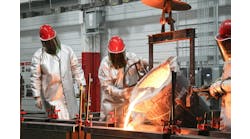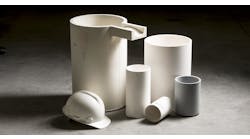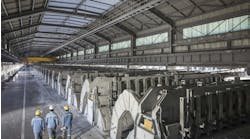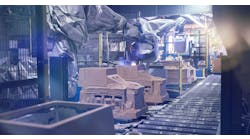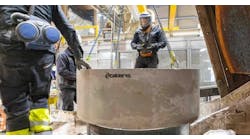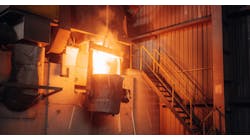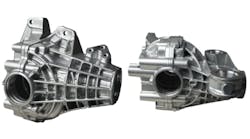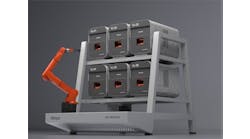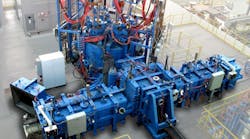Latest from Melt/Pour
Global demand for titanium continues to defy the erratic circumstances that shape the supply of the lightweight, high-strength metal. Commercial aerospace and defense programs are the main causes of the demand, but titanium also has emerged in multiple medical, engineering, and consumer applications. Demand for titanium ingots, castings, and forgings is unlikely to be significantly impacted by the maneuverings at the highly monopolized primary end of the supply chain.
Thus, a recent start-up in France deserves some attention: the EcoTitanium® project reportedly is the first plant in the region designed to produce aviation-grade titanium alloys by recycling. It will produce titanium ingots from scrap (titanium-alloy turnings, massive scrap) collected from commercial and military aircraft OEMs and subcontractors.
The €48-million ($57-million) EcoTitanium joint-venture is headed by UKAD, a French titanium forger. UKAD is itself a joint-venture of Aubert & Duval, the Eramet Group subsidiary that produces open- and closed-die forgings, hot isostatic pressed parts, and bars in high performance steels, superalloys, titanium, and aluminum. The other partner in UKAD is UKTMP, a Kazakhstan-based titanium sponge manufacturing.
While UKAD holds 43.5% in EcoTitanium, other investors are the French government (with 41.3%) via its energy and environment agency; and Crédit Agricole Centre France, a regional bank holding 15.2%. When they announced their venture in late 2014, they emphasized the importance of providing the European aircraft manufacturing industry with a new source of titanium ingot, “independent from American and Russian sources,” giving it greater control over its supply of a strategic raw material.”
Now, they report that EcoTitanium’s start-up signifies the creation of Europe’s first integrated titanium supply stream. In addition to titanium alloys, aerospace customers benefit from a portfolio of ore mining and titanium production at UKTMP in Kazakhstan; open-die forging of titanium ingots at UKAD; closed-die forging of parts at Aubert & Duval; and finishing at MKAD (a joint venture with Mecachrome, inaugurated in October 2016.)
The scrap recycling operation is based on a design developed and supplied by SECO/Warwick Europe (as equipment supplier and main contractor) with Retech Systems (technology and project management provider.)
This installation includes three metallurgical units: a plasma arc melting furnace (PAM) and two vacuum-arc remelting furnaces (VAR) plus accompanying equipment. According to the melting equipment suppliers, plasma melting is commercially viable for producing titanium alloy ingots and castings consistently and efficiently, primarily because plasma melting systems operate under an inert gas atmosphere that allows the alloy composition of the metal to be maintained easily, with minimal evaporative losses (compared to other vacuum processes.)
The Retech PAM consists of a rotary can feeder and vibratory chute combination that delivers turnings to the melt hearth. Also included is a bar feeder, for feeding titanium scrap. Once in the melt hearth the material is thoroughly melted by Retech’s transferred-arc plasma torch.
From there, material continues on to a series of refining hearths where both high- and low-density inclusions are removed under the action of the plasma torches and the residence time provided by the refining hearths. An ingot is formed within the water-cooled copper mold on top of a matching water-cooled copper puller. As the puller withdraws out the bottom of the mold, the titanium alloy solidifies as new liquid continues to flow into the top of the mold.
This system will be able to produce large ingots that will be used as electrodes for the vacuum arc remelting (VAR) operation.
Each of the two Retech VAR furnaces is equipped with two melt stations, designed to melt and refine titanium and titanium-alloy final ingots. These ingots will be produced from fully-dense electrodes produced by Retech’s plasma cold-hearth melting process. New ingots will be formed in a copper crucible by melting the consumable electrode under vacuum conditions, by the means of the electric arc.
According to the joint-venture partners, EcoTitanium’s recycling route will prevent the emission of 100,000 tons of CO2 by consuming four times less that the conventional, ore-based production supply chain. More specifically, it’s expected to establish about 60 full-time positions when it reaches full capacity, producing “several thousand (metric) tons of titanium-alloy ingot per year” of aerospace titanium.
According to Christel Bories, chairman & CEO, “The Eramet Group is proud to support the EcoTitanium project for the creation of a recycling stream that will provide Europe with a titanium supply source which is independent from the major global producers. EcoTitanium is a milestone in Eramet’s constant commitment to environmental and social responsibility, as well as industrial innovation.”
